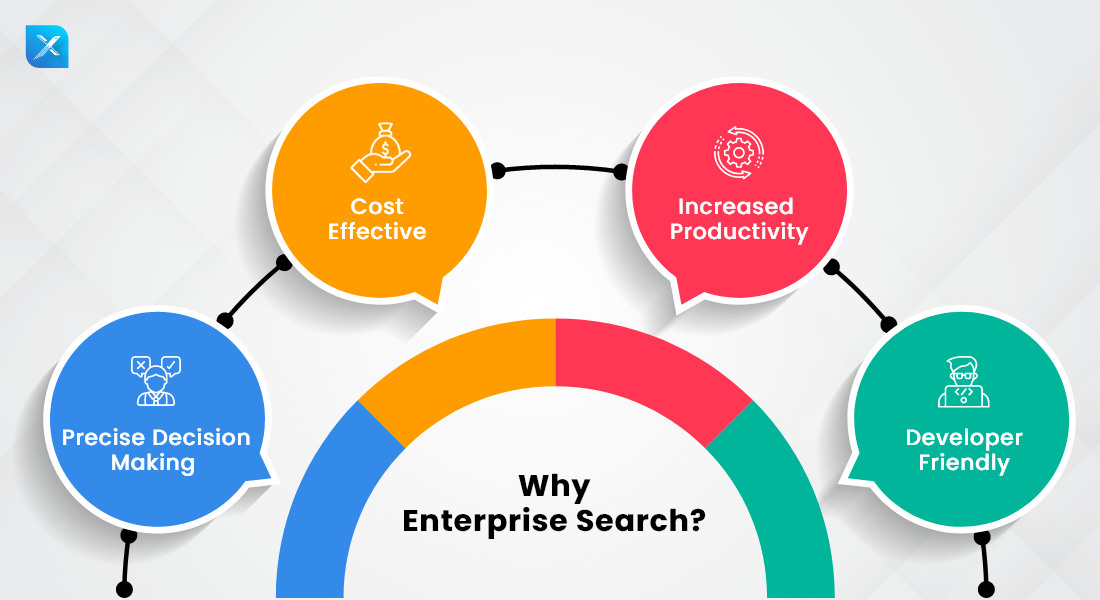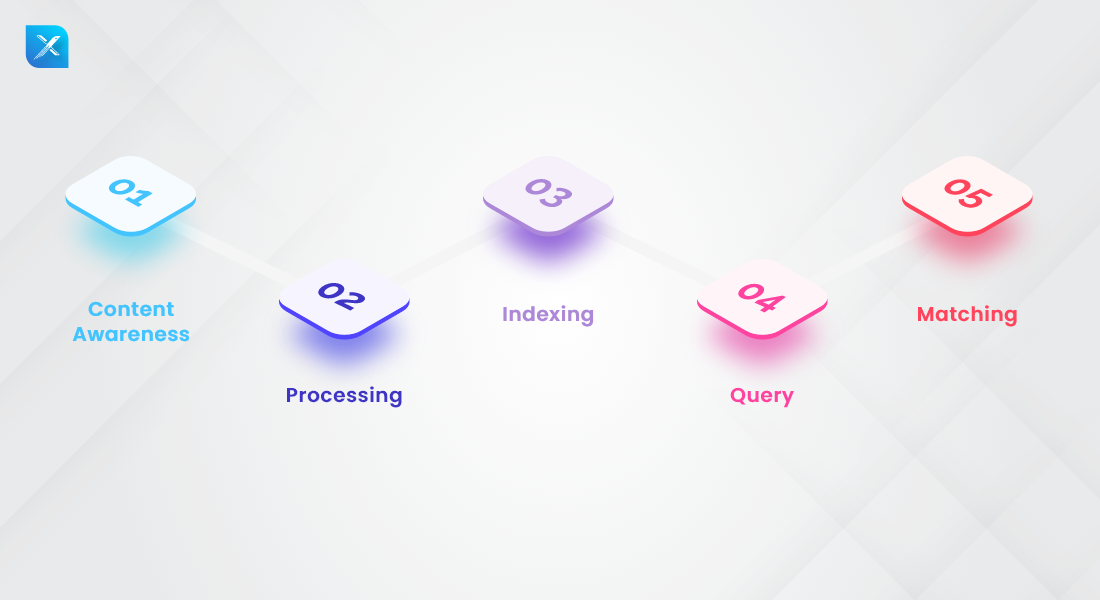Digital Transformation Consulting: Cost, Strategy,...
October 13, 2025

As we all know, everything is moving online, whether it is getting a cab to go somewhere or finding the best food nearby, all services are available at your fingertips. As a business owner or an entrepreneur, you just need to move your business online. Most businesses have moved online to attract more customers and gain more business revenue.
But, as everything is going on the internet and on the cloud, we need more storage space and more databases to store every bit of your business data. So, as an entrepreneur or a company owner dealing with lots of data and databases, a fast way to search anything from your database is what all you need to find your desired file or data from all the content that you manage.
Okay, enough talked! You may have heard many Enterprise Search Service Providers talking about Enterprise Search. But, what exactly is enterprise search? Let’s understand this in a simple way!
So, according to webopedia, “Enterprise search is an extensive search system that provides the means to search both structured and unstructured data sources with a single query.”
So, we can say that Enterprise Search provides the search solution to both structured and unstructured data sources. Different data sources may include application databases, email servers, CMS files, etc, depending on your enterprise system. In short, enterprise search will bring you results from different data sources upon firing one single query, in a fraction of a second! Sounds wonderful! Doesn’t it?
There is a lot of search software currently being used worldwide like Apache Solr, Smart Enterprise Search, etc. but, among all of them, you need to choose the best software that suits all of your needs, so, you must find the software that suits your needs. But, we recommend Enterprise Search to deal with your database and files.

When you adopt Enterprise Search for your business, it will help you make more precise decisions as it delivers instant search results and deals with large databases and files very smoothly. When you find what you want very quickly, your work efficiency will be boosted and you will be able to make more precise decisions.
Enterprise Search provides exceptionally good results when it comes to serving faster search results. Upon implementing this enterprise search, one can avail faster search results from various databases and uplift the work quality manifold. So, in the long-time, you can see that this enterprise search is indeed a cost-effective decision for your business.
When you are responded to your search queries faster, your work becomes faster, and you become more productive unknowingly. So, you can get the Enterprise Search Service Provider and implement it in your current system and boost the productivity of your employees.
Enterprise Search is written in such a way that it is liked by the developers instantly. Its easy-to-integrate nature is loved by developers worldwide, so, implementing enterprise search will be much easier than any other software. Now, you know why most companies recommend implementing enterprise search for your business or enterprise.
So, from all these points, now you must have been clear on why enterprise search is important for your business organization, as it is developer-friendly and returns search results much faster than other software.
Now, as we are clear on why enterprise search is the next big thing, let’s plunge into how it works and see how enterprise search is able to return lightning-fast search results.
So, turning a database or different files into a series of search results is not as easy as it sounds. It takes a lot of effort and queries to return lightning-fast search results. Enterprise search includes a total of five stages. The first three steps are made before any “search” is performed.

Any particular search has to make sure which databases and which files it can access. Deciding on such a thing is called “Content Awareness”. Content Awareness is decided before any search is actually performed.
Just like the previous step, this step Processing is also performed before any search query is fired. All the content which needs to be searched must be converted to the same type of document so that the search can be performed faster. This process is what we call “processing”.
When processing is completed, Indexing takes place. Indexing is sorting all the processed information. Indexing keeps track of frequently used terms in the data sources. By processing and indexing the data sources, the search can be performed relatively faster, as the data is sorted and hence, easy to track.
Now, comes the real “search” process. After being done with processing and indexing, whenever a user enters any text to be searched and then hits enter, the search process starts, and this is what we call ‘query’. The user enters a query to be searched and we return results for it.
After being hit the enter button and the query is fired, comes the task of returning the relevant results. In this last stage, the search text string is matched with the processed and indexed results. Matching text string files are returned in the search results.
Built in Java, Elasticsearch is a shared, open-source search and analytic engine based on Apache Lucene. It began as a robust version of the Lucene open-source search platform and later included support for scaling Lucene indices horizontally. With the help of Elasticsearch, you can store, search, and analyze massive amounts of data fast and in close to real-time, with results arriving in milliseconds. Because it scans an index rather than the text itself, it can produce quick search results. It has comprehensive REST APIs for preserving and accessing the data and employs a model based on documents rather than tables and schemas. Elasticsearch can be conceptualized as a server that can handle JSON queries and return JSON data at its core.
We can better grasp why and how Elasticsearch can be utilized for a wide range of purposes now that we have a basic understanding of what it is, the logical concepts underlying it, and its design. We’ll examine some of Elasticsearch’s most typical use cases and provide examples of how companies are currently utilizing it in the sections that follow.
Search for applications — for software programs that significantly rely on search platforms to obtain, retrieve, and report data.
Website search – Internet search Elasticsearch is a highly helpful tool for doing efficient and precise searches on websites that store a lot of content. It should come as no surprise that Elasticsearch is advancing in the area of site searches.
Enterprise search — Elasticsearch enables enterprise-wide search for everything you can imagine, including documents, products from online stores, blogs, people, and individuals. In reality, it has gradually supplanted and taken over the search functions of the majority of the well-known websites we visit every day. From a more enterprise-specific standpoint, company intranets successfully utilize Elasticsearch.
Analytics for logs and logging — Elasticsearch is frequently used for ingesting and analyzing log data in light of recent developments and in a scalable manner, as we’ve discussed. Additionally, it offers crucial actionable insight on log data that motivate actions.
Monitoring of containers and infrastructure metrics — The ELK stack is utilized by many businesses to evaluate various KPIs. Data collection across a number of performance criteria that differ depending on the use case may be necessary.
Analysis of security systems – Security analysis is one of Elasticsearch’s key analytics applications. Access logs and other system security-related logs can be examined using the ELK stack, providing you a more full picture of what’s going on in your systems in real-time.
You can avail of elastic search consulting services from a reputable organization to get better support and assistance.
We always look for example whenever we have to try anything new which costs money. So, here are some of the live examples of companies who have used Elastic search to analyze customer service operations.
Building search applications using the open-source search platform Solr. It was constructed above Lucene. Efficient, robust, and enterprise-ready are all qualities of Solr. Solr is used to create dynamic, high-performance applications.
Yonik Seely developed Solr in 2004 so that CNET Networks’ corporate website would include search functionality. In January 2006, it was accepted as an open-source undertaking by the Apache Software Foundation.
Hadoop and Solr can be utilized together. Solr assists us in locating the necessary data from such a vast source because Hadoop manages a lot of data. Solr can be used for storage in addition to search. It is a non-relational data storage and processing technique, similar to other NoSQL databases.
In a nutshell, Solr is a search engine that is scalable, ready for deployment, and tuned to search massive volumes of textual information.
To move forward let’s understand some of the advantages of a smart enterprise search for your customers.
Enterprise search is useful for more than just your internal employees.
To help develop cutting-edge digital experiences for your customers. You must also make use of your data, subject matter, and product information. In order to ensure that clients receive the most engaging and customized experience possible, depending on their particular tastes, it should include personalized suggestions, smarter product recommendations, and other intelligent features that make use of ML algorithms.
Enterprise search gives your consumers access to a super-quick, precise search platform that enables them to locate the precise content they require at the precise moment they require it. You are equipped to improve the client journey in real-time at every level thanks to capabilities enabled by artificial intelligence, such as personalized recommendations and recommended items.
The user experience personalization of your site can be greatly influenced by analytics. Your search applications and user activity data can be used to continuously enhance and tailor the user experience. This aids in informing additional optimization that propels your company’s performance.
Utilizing your data in this way has many benefits, including ensuring that your website or app reveals the most pertinent results in a search and transforming it into a tool for attracting, converting, and keeping customers.
Fast and simple access to the material your company offers is essential since the average customer reads 13 snippets before making a purchase.
Your website or mobile application can compete with the largest names in technology, like Amazon, and Netflix, in the era of effective search engines.
How do you make the most of this potent search engine? There are various approaches that you may take, as we’ve just discussed, but this really depends on your unique use case. You have the choice of using a post search API or building your own. Which is better, though?
While this is a tried-and-true method to acquire a personalized workplace search engine that suits you, it can be very costly and complex. You’ll require a committed engineering staff as well as internal search skills. Also, there are real financial issues, such as the continual expense of the engineering and IT staff needed to guarantee uptime and increase functionality.
Additionally, it might be less dependable and harder to safeguard. A completely customized search API needs its own security upgrades and patches, which uses up more budget for the project and leads to more time and money.
Enhanced enterprise search can be implemented at your company more affordably and reliably by using a hosted search API that has been created by experts. Additionally, it expands with time as content or product catalogs expand and change as per user expectations.
The requirement for intensive internal IT and engineering is decreased by the presence of a third-party search API. Additionally, it implies that security and dependability are managed by full-time specialists, ensuring the safety of your data at all times. Additionally, you might discover that hiring a technology expert that offers search as a service results in cheaper overall expenditures over time.
After reading all the above points, you must have been cleared on Enterprise Search and how it works, and why should you implement Smart Enterprise Search in your next project. Apache solr and elastic search are two of its major software which you can choose to go with. Now you know that whether it is providing lightning-fast search results or getting your company system a brand new search software that is actually powerful, you need to implement Enterprise Search in your system and boost the searching capability of the system!
You can find Enterprise Search Services Provider here! JUST IN CASE!